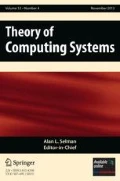Abstract
The module theoretic framework in linear time invariant system theory is extended to include stability considerations as well. The resulting setup is then applied to an investigation of nonsingular, causal, and stable precompensation. The main issues are resolved through the introduction of two sets of integer invariants-thestability indices and thepole indices. The stability indices characterize the dynamical properties of all the stable systems that can be obtained from a specified system through the application of nonsingular, causal, and stable precompensation. The pole indices characterize the dynamical properties of all the nonsingular, causal, and stable precompensators that stabilize a specified system.
Similar content being viewed by others
References
F. M. Brasch and J. B. Pearson. Pole placement using dynamic compensators,IEEE Transactions on Automatic Control, 15:34–43 (1970).
P. Brunovski. A classification of linear controllable systems, Kybernetika, 3:173–187 (1970).
C. A. Desoer, R. W. Liu, J. Murray, and R. Saeks. Feedback system design: the fractional representation approach to analysis and synthesis,Trans IEEE, 25:399–412 (1980).
P. A. Furhmann. Algebraic system theory: an analyst's point of view, Journal of the Franklin Institute, 301:521–540 (1976).
I. C. Gokhberg and M. G. Krein. Systems of integral equations on a half line with kernels depending on the difference of arguments, Am. Math. Soc., Translations, 14: 2:217–287 (1960).
J. Hammer. Linear dynamic output feedback: invariants and stability, to appear inIEEE Trans. on Automatic Control, April 1983 (1981).
J. Hammer and M. Heymann. Pole assignment and minimal feedback design,International Journal on Control, 37:63–88 (1983).
J. Hammer and M. Heymann. Causal factorization and linear feedback,SIAM J. on Control and Optimization, 19:445–468 (1981).
J. Hammer and M. Heymann. Strictly observable rational linear systems,SIAM J. on Control and Optimization, 21:1–16 (1983).
M. L. J. Hautus and M. Heymann. Linear feedback—an algebraic approach,SIAM Journal on Control and Optimization 16:83–105 (1978).
R. E. Kalman. Algebraic structure of linear dynamical systems. I: The module of Σ,Proceedings of the National Academy of Science (USA), 54: 1503–1508 (1965).
R. E. Kalman.Lectures on Controllability and Observability, CIME (1968).
R. E. Kalman. Kronecker invariants and feedback, inOrdinary Differential Equations, 1971 NRL-MRC Conference, L. Weiss ed., pp. 459–471, Academic Press, New York (1971).
R. E. Kalman, P. L. Falb and M. A. Arbib.Topics in Mathematical System Theory, McGraw-Hill, New York (1969).
P. P. Khargonekar and E. Emre. Further results on polynomial characterizations of (F, G)-invariant subspaces, preprint, Center for Mathematical System Theory, University of Florida, Gainesville, FL 32611, U.S.A. (1980).
H. Kwakernaak and R. Sivan.Linear Optimal Control Systems, Wiley-Interscience, New York (1972).
C. C. MacDuffee.The Theory of Matrices, Chelsea, New York (1934).
A. S. Morse. System invariants under feedback and cascade control, Proceedings of the conference on Mathematical System Theory, Udine, Italy, pages 61–74. Appeared inLecture Notes in Economics and Mathematical Systems, 131, (G. Marchesini and S. Mitter, editors), Springer Verlag, Berlin (1975).
H. F. Münzner and D. Prätzel-Wolters. Minimal bases of polynomial modules, structural indices and Brunovsky-transformations,Int. J. Control 30:291–318 (1979).
L. Pernebo. An algebraic theory for the design of controllers for linear multivariable systems—part I: structure matrices and feedforward design,Trans. IEEE, AC 26:171–183 (1981).
H. H. Rosenbrock.State Space and Multivariable Theory, Nelson, London (1970).
J. H. M. Wedderburn.Lectures on Matrices, Colloquium publication of the AMS,XVII. Also, Dover publication, New York, 1964 (1934).
W. A. Wolovich.Linear Multivariable Systems, Applied Mathematical Sciences Series, No. 11, Springer Verlag, New York (1974).
W. A. Wolovich and P. L. Falb. Invariants and canonical forms under dynamic compensation,SIAM Journal on Control, 14:996–1008 (1976).
W. M. Wonham.Linear Multivariable Control: A Geometric Approach, Lecture Notes in Economics and Mathematical Systems, No. 101, Springer Verlag, New York (1974).
B. F. Wyman.Linear Systems Over Commutative Rings, Lecture Notes, Stanford University, Stanford, CA., U.S.A. (1972).
D. C. Youla. On the factorization of rational matrices,IRE Transactions on Information Theory, pp. 172–189 (1961).
O. Zariski and P. Samuel.Commutative Algebra, D. Van Nostrand Co., New York (1958).
Author information
Authors and Affiliations
Additional information
This research was done while the author was with the Center for Mathematical System Theory, University of Florida, Gainesville, Florida 32611, USA, and was supported in part by US Army Research Grant DAAG29-80-C0050 and US Air Force Grant AFOSR76-3034D.
Rights and permissions
About this article
Cite this article
Hammer, J. Stability and nonsingular stable precompensation: An algebraic approach. Math. Systems Theory 16, 265–296 (1983). https://doi.org/10.1007/BF01744583
Received:
Revised:
Issue Date:
DOI: https://doi.org/10.1007/BF01744583


